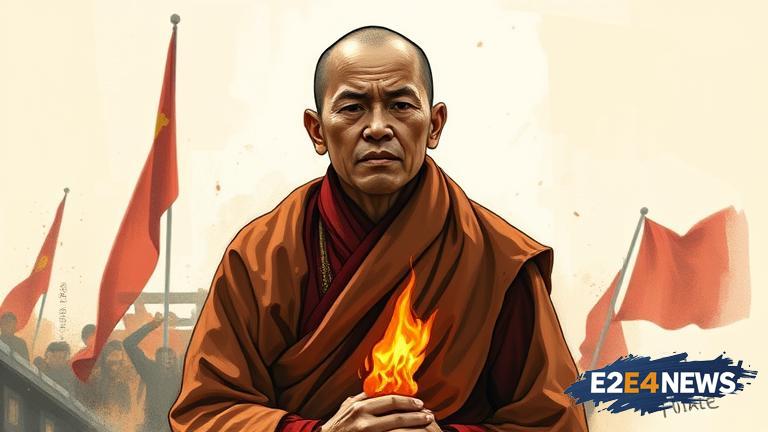In a tragic incident, a Tibetan monk has self-immolated in protest against the Chinese government’s rule in Tibet. The incident occurred on August 26, 2025, in the Ngaba region of Tibet. The monk, whose identity has not been disclosed, set himself on fire in a desperate attempt to draw attention to the plight of the Tibetan people. This incident is the latest in a series of self-immolations that have taken place in Tibet over the years, with many Tibetans resorting to this extreme form of protest to highlight the human rights abuses and lack of freedom in the region. The Chinese government has been accused of suppressing the Tibetan culture and imposing its own rules and regulations on the people of Tibet. The situation in Tibet has been tense for many years, with the Tibetan people demanding greater autonomy and freedom from Chinese rule. The self-immolation of the Tibetan monk has sparked widespread condemnation and outrage, with many calling for the Chinese government to respect the human rights of the Tibetan people. The incident has also highlighted the need for the international community to take notice of the situation in Tibet and to put pressure on the Chinese government to reform its policies. The Tibetan government-in-exile has expressed its deep sadness and concern over the incident, and has called for the Chinese government to stop its repressive policies in Tibet. The incident has also sparked protests and demonstrations in many parts of the world, with Tibetans and supporters of the Tibetan cause demanding freedom and human rights for the people of Tibet. The self-immolation of the Tibetan monk is a stark reminder of the desperation and frustration felt by many Tibetans, who are forced to live under the oppressive rule of the Chinese government. The incident has also highlighted the need for dialogue and negotiation between the Chinese government and the Tibetan government-in-exile, in order to find a peaceful solution to the Tibet issue. The international community has a crucial role to play in promoting peace and stability in the region, and in supporting the Tibetan people’s struggle for freedom and human rights. The Chinese government must be held accountable for its actions in Tibet, and must be pressured to respect the human rights and dignity of the Tibetan people. The self-immolation of the Tibetan monk is a tragic reminder of the ongoing struggle for freedom and human rights in Tibet, and highlights the need for urgent action to address the situation. The Tibetan people have been suffering for many years, and it is time for the international community to take notice and to act. The incident has also sparked a debate about the effectiveness of self-immolation as a form of protest, with some arguing that it is a desperate and extreme measure that can have unintended consequences. However, for many Tibetans, self-immolation is seen as a last resort, and a desperate attempt to draw attention to their plight. The incident has also highlighted the need for the Chinese government to reform its policies in Tibet, and to address the grievances of the Tibetan people. The Tibetan government-in-exile has called for the Chinese government to stop its repressive policies in Tibet, and to engage in dialogue and negotiation to find a peaceful solution to the Tibet issue. The international community must support the Tibetan people’s struggle for freedom and human rights, and must pressure the Chinese government to respect the human rights and dignity of the Tibetan people. The self-immolation of the Tibetan monk is a tragic incident that highlights the ongoing struggle for freedom and human rights in Tibet, and the need for urgent action to address the situation.
